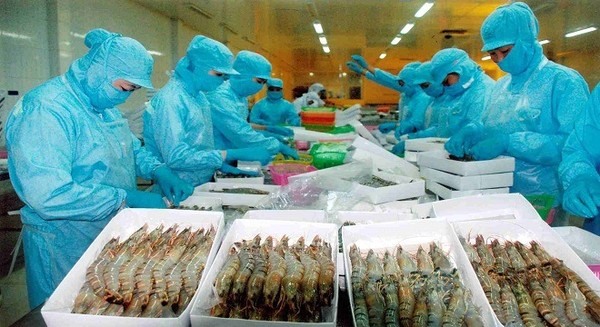 Economy
Economy

Although the Vietnamese Good Agriculture Practice (VietGap) was issued for seafood breeding five years ago, enterprises are not enthusiastic about using this standard as a qualification for their product exports.
 |
| Minh Phú Seafood Joint Stock Corporation only needs certifications of Best Aquaculture Practices (BAP), Aquaculture Stewardship Council (ASC) certification and Global Gap -- an internationally recognised set of farm standards dedicated to Good Agricultural Practices. — Photo minhphu.com |
HCM CITY — Although the Vietnamese Good Agriculture Practice (VietGap) was issued for seafood breeding five years ago, enterprises are not enthusiastic about using this standard as a qualification for their product exports.
In 2011, as preparation for the fisheries sector to actively penetrate the world market, the Ministry of Agriculture and Rural Development said the VietGap practice should be applied in aquaculture, mainly for three species -- tra fish, tiger prawn and white-leg shrimp.
Lê Văn Quang, chairman of the Minh Phú Seafood Joint Stock Corporation which has been processing and exporting shrimp for 35 years, said the company had not met any customers who required products to be certified with VietGap.
They only needed certifications of Best Aquaculture Practices (BAP), Aquaculture Stewardship Council (ASC) certification and Global Gap -- an internationally recognised set of farm standards dedicated to Good Agricultural Practices, he said.
He added that the criteria required by VietGap were even higher than other certifications. Therefore, he suggested shrimp farms in Việt Nam be required to meet standards of BAP and ASC, instead of VietGap.
"BAP certification is globally used and Vietnamese shrimp products are mainly sold abroad. So, why does Việt Nam not use the certification to certify all stages of shrimp production?” Quang told a Vietnam News Agency correspondent.
“Currently, the state is supporting farmers to achieve VietGap certification, but it would be more reasonable to use that money to help them achieve BAP and ASC certifications to reduce production costs and make Vietnamese shrimp products more competitive," Quang suggested.
Nguyễn Thị Hồng Phước, head of the raw materials procurement division of the HCM City-based Vĩnh Lộc Food Processing and Trade Co Ltd, said based on the certification requirements of an importer, the company would appoint a person to go on a fact-finding tour to farming areas in the Mekong Delta region.
Farming areas that met the importer’s requirement would be chosen to sign contracts and the company would commit to do long-term business with well-performing areas, she said.
The company only exported VietGap certified goods to markets which did not demand specific certifications.
Explaining reasons why enterprises are not interested in the VietGap certification system, Trương Đình Hòe, general secretary of the Association of Seafood Exporters and Producers (VASEP), said certificates such as GlobalGap and ASC were standards used on a voluntary basis.
Businesses that wanted to export to any market must meet the standards of that particular market. Western European countries required Global Gap certification while American market demanded the BAP certificate.
These standards helped increase the added value of the enterprises’ products.
However, VietGap, currently, was not a requirement of importers, so companies were not ready to meet those standards.
"In fact, if we do a good job in introducing and promoting the VietGap certificate, it will be more easily recognised and well-known in other countries and applying VietGap will become more popular,” Hòe said.
“VietGap will be a commitment by exporters that the products they make are strictly monitored for food safety and hygiene.
“VASEP always encourages businesses and farmers apply the VietGap process in aquaculture to meet the increasing needs of export markets," he added.
Nguyễn Việt Thắng, chairman of the Việt Nam Fisheries Association, said VietGap was an essential criterion for assessing food safety for Vietnamese products.
World over, each country has a certain standard and symbol to address food safety issues. Exporters who want to sell their products in a market have to ensure they satisfy the standard applied in the market, according to the chairman.
However, to avoid enterprises applying for 3-4 certificates at the same time, Thắng said the Government had asked the Ministry of Agriculture and Rural Development and the Directorate of Fisheries to study the possibility of connecting the certification systems. — VNS




